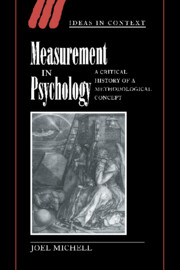Book contents
- Frontmatter
- Contents
- Preface
- Acknowledgments
- 1 Numerical data and the meaning of measurement
- 2 Quantitative psychology's intellectual inheritance
- 3 Quantity, number and measurement in science
- 4 Early psychology and the quantity objection
- 5 Making the representational theory of measurement
- 6 The status of psychophysical measurement
- 7 A definition made to measure
- 8 Quantitative psychology and the revolution in measurement theory
- Glossary
- List of references
- Index
- IDEAS IN CONTEXT
8 - Quantitative psychology and the revolution in measurement theory
Published online by Cambridge University Press: 22 September 2009
- Frontmatter
- Contents
- Preface
- Acknowledgments
- 1 Numerical data and the meaning of measurement
- 2 Quantitative psychology's intellectual inheritance
- 3 Quantity, number and measurement in science
- 4 Early psychology and the quantity objection
- 5 Making the representational theory of measurement
- 6 The status of psychophysical measurement
- 7 A definition made to measure
- 8 Quantitative psychology and the revolution in measurement theory
- Glossary
- List of references
- Index
- IDEAS IN CONTEXT
Summary
The revolution that axiomatic measurement theory might have touched off has not yet occurred.
(Norman Cliff)The only revolution properly so called is an intellectual revolution, ‘a revolution in ideas’.
(John Anderson)The shift from the classical understanding of measurement to that encapsulated by Stevens' definition is unsustainable. Not only does acceptance of Stevens' definition sever connections between mainstream quantitative psychology and the traditions of quantitative science, it blinds those who accept it to the character of quantification, thereby causing them to ignore fundamental empirical commitments of quantitative theorising. Mainstream quantitative psychology is now in the anomalous position of being unable to consider the measurability thesis in the critical manner characteristic of normal science. When a science's institutionalised ways of proceeding impede critical inquiry into some issue relevant to its subject matter, then that science subverts itself as a cognitive enterprise.
As a social movement, science is a complex phenomenon. It always serves diverse social and personal interests. These may sometimes oppose those of critical inquiry. There are dramatic instances of this, like scientific fraud, when scientists claim results which they know they do not have. In general, however, scientific fraud is an aberration of individual scientists, not of entire disciplines. More dramatic still are cases where the scientists of a particular nation are completely overwhelmed by non-scientific interests to the extent that critical inquiry into relevant issues stops, as illustrated by the case of Lysenko and the political domination of Soviet genetics (Soyfer, 1994).
- Type
- Chapter
- Information
- Measurement in PsychologyA Critical History of a Methodological Concept, pp. 191 - 219Publisher: Cambridge University PressPrint publication year: 1999

